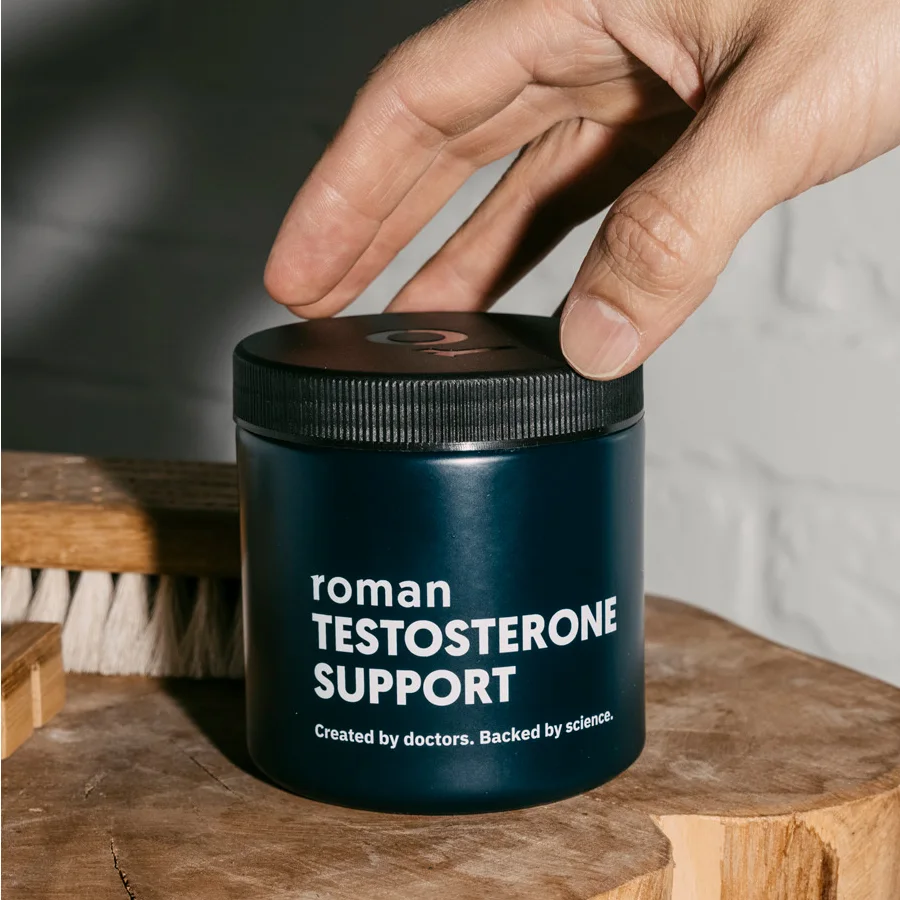Here's what we'll cover
Here's what we'll cover
Many people know that testosterone is responsible for changes like body hair growth and voice deepening that come with male puberty. But after puberty, testosterone's work is far from done. Testosterone levels typically decline with age, and other causes of low testosterone (or low T) may cause undesirable symptoms like low sex drive.
If testosterone levels drop below a certain level and cause unwanted symptoms, healthcare professionals typically recommend treatments, such as testosterone replacement therapy (TRT) or other medications, like clomiphene. But besides injections and pills, there are several ways to naturally increase testosterone levels through certain lifestyle modifications. For instance, the American Urological Association (AUA) recommends that exercise and weight management have the potential to increase total testosterone levels and reduce signs and symptoms that come with low T (Mulhall, 2018).
Read on to learn more about how to increase testosterone naturally.
What is testosterone?
Testosterone, along with DHT (a related hormone), is the sex hormone responsible for developing male secondary sexual characteristics. During puberty, testosterone and DHT levels increase and lead to:
Penis and testicle growth
Increased muscle mass
Voice deepening
Increase in height
Increased sex drive
Testosterone plays a vital role in your health throughout life—not just during puberty. It regulates libido, erectile function, sperm production, bone density, muscle mass, mood stability, and more. While testosterone is widely considered a “male sex hormone” and is present in much higher levels in men, it’s an essential hormone in women, too.
Testosterone begins to decline in older adults starting in their 30s and 40s. Low testosterone can cause a lower libido, erectile dysfunction, fatigue, weight gain, and a loss of muscle mass, just to name a few symptoms (Nassar, 2022).
8 natural testosterone boosters
Some research suggests you may be able to promote healthy testosterone levels naturally, reaping the health benefits that result. Let’s look at eight possible ways to increase your testosterone naturally.
1. Exercise
You can be your own source of testosterone therapy by engaging in more physical activity. The effect of exercise on testosterone levels is likely due to a combination of factors, including the type of exercise, intensity, age, weight, etc.
Some studies show that building muscle via strength or resistance training is the most effective way to support testosterone levels. However, others recommend high-intensity interval training or HIIT, especially for older adults. HIIT has become a hot topic in recent years. During a HIIT workout, you engage in periods of intense cardio, alternating with periods of less-intense activity. One small study showed that combining intensity and resistance training led to an increase in testosterone levels that lasted up to 48 hours after the workout (Riachy, 2020; Hayes, 2019).
Regardless, exercise is one of the best things you can do for your health. It helps you maintain a healthy weight, is good for your heart, and may help restore your T levels.
2. Improve your diet
Eating a healthy diet can increase your body's levels of testosterone. Studies suggest that adopting healthy eating patterns may promote T production. They emphasize whole foods, with a balance of lean protein and complex carbs. Within reason, it’s a good idea to limit simple carbs and overly processed foods (Skoraka, 2020).
Most experts recommend eating heart-healthy fats such as olive oil, avocados, and nuts. Data shows that a diet too low in fat can lower testosterone levels (Pearce, 2019; Fantus, 2020).
3. Get enough quality sleep
It should come as no surprise that sleep is good for you. Studies show that shut-eye benefits the brain, metabolism, and heart; it's crucial to preserving your health, including your sexual health.
Sleep is a natural testosterone booster. That’s because your body produces most of your testosterone while you sleep. If you're not getting enough sleep or your sleep is low quality (e.g., you have trouble falling or staying asleep or have sleep apnea), you might see your testosterone levels decline (Liu, 2019).
4. Minimize stress
Managing stress helps preserve your sanity, heart health, and relationships. When you're under a lot of stress, the adrenal glands pump out cortisol, a stress hormone. Research suggests that higher levels of cortisol lead to decreases in testosterone levels (Harden, 2016).
Moreover, high cortisol levels encourage weight gain, and obesity is associated with lower testosterone levels.
5. Consider natural testosterone supplements
Research on testosterone supplements is limited, but some studies suggest that certain ingredients in supplements may help support testosterone, including:
Vitamin D: Some research suggests that people with low testosterone and low vitamin D levels may benefit from taking vitamin D supplements. However, other studies offer conflicting results, and more research is needed. If you have low levels of testosterone, consider having your vitamin D levels checked with a blood test and talk to your healthcare provider about vitamin D supplementation (Pilz, 2011; Lerchbaum, 2017).
Magnesium: Magnesium plays a crucial role in several bodily processes, including bone structure and muscle function. Some data suggests that there may be a relationship between magnesium and testosterone levels. Magnesium acts as an antioxidant and may protect testosterone from the effects of oxidative stress. While scientists are not certain of the mechanism, magnesium supplementation may play a role in testosterone maintenance. More research is needed (Zamir, 2021).
Zinc: Zinc positively affects the hormone responsible for stimulating testosterone production, luteinizing hormone (LH). It also helps convert testosterone to DHT. Currently, there’s not much research on whether zinc supplementation impacts testosterone levels, but it may be worth exploring if your zinc levels are low (Zamir, 2021).
Ashwagandha: This medicinal herb is an adaptogen, a natural agent that helps the body manage stress. In a small 2019 study, men with excess weight who took an ashwagandha supplement for 16 weeks saw an almost 15% increase in testosterone levels on average compared to men who received a placebo (Lopresti, 2019).
Fenugreek: This herb can be found in over-the-counter supplements. The jury is still out as to whether fenugreek can promote higher testosterone levels. A review of the medical literature found that some studies suggest it may improve testosterone, while others show that fenugreek has no effect. More research is needed (Balasubramanian, 2019).
DHEA: Dehydroepiandrosterone, or DHEA, is a hormone produced in the adrenal glands. It is the precursor to the precursors of testosterone. This means it may increase levels of the hormones that eventually become testosterone (like androstenedione and androstenediol), but it does not seem to affect testosterone levels directly (Kovac, 2016).
6. Avoid alcohol in high amounts
Drinking alcohol in excess can cause a decline in testosterone. But how much is too much? Although no specific recommendations have been made for preserving testosterone, experts advise no more than two drinks per day for men and one for women to reduce the risk of cancer and heart disease (Rachdaoui, 2017).
7. Try to avoid xenoestrogen and estrogen-like products
Certain chemicals, known as "endocrine disruptors," have negatively affected hormone levels in animal models. These include BPA (a common element in plastics), phthalates, and parabens (synthetic compounds used in personal-care products and laundry detergent, among other products). They may act as xenoestrogens or synthetic estrogens, meaning your body thinks they are estrogen, potentially throwing off your normal hormonal balances (Wang, 2021). That said, the research is still quite limited.
Human studies have not shown that xenoestrogens or phytoestrogens (like soy) affect testosterone levels (Reed, 2021). However, some xenoestrogens have been linked to other health conditions (Wang, 2021).
8. Take a look at your prescription medications
Some prescription drugs, such as certain antifungal medications and some antidepressants, may lower testosterone levels in some men. If you're experiencing symptoms of low testosterone and suspect your medicine may be responsible, talk with your healthcare provider. That might be the case, or it might not. In any event, don't stop taking any prescribed medications without consulting a medical professional.
If low testosterone is causing you less-than-desirable symptoms, don’t despair. You can explore natural methods to boost your testosterone or medical alternatives like testosterone replacement therapy (TRT) or Clomid. Make an appointment with your healthcare provider to find a treatment plan that’s right for you.
What is the FDA-approved use of Clomid®️?
Clomid citrate is indicated for the treatment of ovulatory dysfunction in women who want to become pregnant. The drug works by increasing the amount of hormones that support the growth and release of a mature egg (ovulation).
Your provider may also recommend the use of Clomid to increase testosterone levels in men with low testosterone.
Who should not use Clomid?
Do not use Clomid if:
You have a known allergic reaction to clomiphene citrate, the active ingredient in Clomid.
You have ever had problems with your liver.
You have any of these health problems: adrenal gland disease, brain tumor, pituitary gland disease, or thyroid gland disease.
If you were assigned female at birth, you should not use Clomid if:
You have any of these health problems: endometriosis, endometrial cancer, enlarged ovaries or ovarian cysts, high levels of prolactin in the blood, or low levels of estrogen in the blood.
Your ovaries no longer make eggs, also called primary ovarian failure.
You have unexplained vaginal bleeding.
You are pregnant or may be pregnant.
How should I take Clomid?
Clomid comes as a tablet and is taken by mouth. Take Clomid exactly as directed by your provider, and don’t take more or less of it or take it more often than prescribed. Your dosage is based on your medical condition and response to therapy.
Unless your provider tells you otherwise, you can continue your normal diet.
What should I tell my provider before using Clomid?
It’s important to tell your provider all of the medications you are currently taking, including prescription, over-the-counter medications, vitamins, and herbal and dietary supplements.
Withholding or providing inaccurate information about your health and medical history to obtain treatment may result in harm.
What are the most serious side effects that I or a caregiver should monitor for when taking Clomid?
If you are experiencing a medical emergency, call 911 or seek immediate medical attention.
Clomid can cause rare, but potentially serious side effects:
Visual symptoms: This medication can cause blurred eyesight, seeing spots or flashes, or double vision. These symptoms may show up or get worse in bright light. Most often, eyesight gets back to normal when the drug is stopped. Do not drive a car or operate machinery, especially in poor lighting, until you know how this medication affects you.
Increased triglyceride levels: Can occur with longer duration of treatment with clomiphene. You should be monitored for triglyceride levels if you have preexisting hyperlipidemia or family history of hyperlipidemia.
If you were assigned female at birth, these serious side effects may occur:
Ovarian hyperstimulation syndrome (OHSS): Call your provider right away if you have severe stomach pain or bloating; a very upset stomach, throwing up, or diarrhea; a big weight gain; shortness of breath; or change in how much urine is passed.
Ovarian cancer: In women, long-term use of clomiphene may increase the risk of ovarian cancer, but a causal relationship has not been determined yet.
Multiple pregnancy: Clomid increases the chance of multiple pregnancy (twins or more).
What are the most common side effects of Clomid?
Flushing (feeling of warmth)
Abdominal pain and discomfort
Nausea and vomiting
Breast discomfort
Visual symptoms
You are encouraged to report negative side effects of prescription products to the FDA. Visit www.fda.gov/medwatch or call 1-800-FDA-1088.
This information is not comprehensive. Please see the full Prescribing Information for complete safety information.
DISCLAIMER
If you have any medical questions or concerns, please talk to your healthcare provider. The articles on Health Guide are underpinned by peer-reviewed research and information drawn from medical societies and governmental agencies. However, they are not a substitute for professional medical advice, diagnosis, or treatment.
Balasubramanian, A., Thirumavalavan, N., Srivatsav, A., et al. (2019). Testosterone imposters: an analysis of popular online testosterone boosting supplements. The Journal of Sexual Medicine , 16 (2), 203–212. doi:10.1016/j.jsxm.2018.12.008. Retrieved from https://www.ncbi.nlm.nih.gov/pmc/articles/PMC6407704/
Fantus, R. J., Halpern, J. A., Chang, C., et al. (2020). The association between popular diets and serum testosterone among men in the United States. The Journal of Urology , 203 (2), 398–404. doi:10.1097/JU.0000000000000482. Retrieved from https://pubmed.ncbi.nlm.nih.gov/31393814/
Harden, K. P., Wrzus, C., Luong, G., et al. (2016). Diurnal coupling between testosterone and cortisol from adolescence to older adulthood. Psychoneuroendocrinology , 73 , 79–90. doi:10.1016/j.psyneuen.2016.07.216. Retrieved from https://www.ncbi.nlm.nih.gov/pmc/articles/PMC5048541/
Hayes, L. D. & Elliott, B. T. (2019). Short-term exercise training inconsistently influences basal testosterone in older men: a systematic review and meta-analysis. Frontiers in Physiology , 9 , 1878. doi:10.3389/fphys.2018.01878. Retrieved from https://www.ncbi.nlm.nih.gov/pmc/articles/PMC6339914/
Kovac, J. R., Pan, M., Arent, S., & Lipshultz, L. I. (2016). Dietary adjuncts for improving testosterone levels in hypogonadal males. American Journal of Men's Health , 10 (6), NP109–NP117. doi:10.1177/1557988315598554. Retrieved from https://pubmed.ncbi.nlm.nih.gov/26272885/
Liu, P. Y. (2019). A clinical perspective of sleep and andrological health: assessment, treatment considerations, and future research. The Journal of Clinical Endocrinology and Metabolism , 104 (10), 4398–4417. doi:10.1210/jc.2019-00683. Retrieved from https://www.ncbi.nlm.nih.gov/pubmed/31042277
Lopresti, A. L., Drummond, P. D., & Smith, S. J. (2019). A randomized, double-blind, placebo-controlled, crossover study examining the hormonal and vitality effects of ashwagandha (Withania somnifera) in aging, overweight males. American Journal of Mens Health , 13 (2), 1557988319835985. doi:10.1177/1557988319835985. Retrieved from https://www.ncbi.nlm.nih.gov/pmc/articles/PMC6438434/
Lerchbaum, E., Pilz, S., Trummer, C., et al. (2017). Vitamin D and testosterone in healthy men: a randomized controlled trial. Journal of Clinical Endocrinology and Metabolism , 102 (11), 4292–4302. doi:10.1210/jc.2017-01428. Retrieved from https://pubmed.ncbi.nlm.nih.gov/28938446/
Mulhall, J. P., Trost, L. W., Brannigan, R. E., et al. (2018). Evaluation and management of testosterone deficiency: AUA Guideline. Journal of Urology, 200 (2): 423–432. doi:10.1016/j.juro.2018.03.115. Retrieved from https://pubmed.ncbi.nlm.nih.gov/29601923/
Nassar, G. N. & Leslie, S. W. (2022). Physiology, testosterone. StatPearls . Retrieved on Jan. 6, 2022 from https://www.ncbi.nlm.nih.gov/books/NBK526128/
Pearce, K. L. & Tremellen, K. (2019). The effect of macronutrients on reproductive hormones in overweight and obese men: a pilot study. Nutrients , 11 (12), 3059. doi:10.3390/nu11123059. Retrieved from https://www.ncbi.nlm.nih.gov/pmc/articles/PMC6950136/ .
Pilz, S., Frisch, S., Koertke, H., et al. (2011). Effect of vitamin D supplementation on testosterone levels in men. Hormone and Metabolic Research, 43 (03), 223–225. doi:10.1055/s-0030-1269854. Retrieved from https://pubmed.ncbi.nlm.nih.gov/21154195/
Rachdaoui, N. & Sarkar, D. K. (2017). Pathophysiology of the effects of alcohol abuse on the endocrine system. Alcohol Research: Current Reviews , 38 (2), 255–276.Retrieved from https://www.ncbi.nlm.nih.gov/pmc/articles/PMC5513689/
Reed, K. E., Camargo, J., Hamilton-Reeves, J., et al. (2021). Neither soy nor isoflavone intake affects male reproductive hormones: an expanded and updated meta-analysis of clinical studies. Reproductive Toxicology (Elmsford, N.Y.), 100 , 60–67. doi:10.1016/j.reprotox.2020.12.019. Retrieved from https://pubmed.ncbi.nlm.nih.gov/33383165/
Riachy, R., McKinney, K., & Tuvdendorj, D. R. (2020). Various factors may modulate the effect of exercise on testosterone levels in men. Journal of Functional Morphology and Kinesiology , 5 (4), 81. doi:10.3390/jfmk5040081. Retrived from https://www.ncbi.nlm.nih.gov/pmc/articles/PMC7739287/
Skoracka, K., Eder, P., Łykowska-Szuber, L., et al. (2020). Diet and nutritional factors in male (in)fertility-underestimated factors. Journal of Clinical Medicine , 9 (5), 1400. doi:10.3390/jcm9051400. Retrieved from https://www.ncbi.nlm.nih.gov/pmc/articles/PMC7291266/
Wang, X., Ha, D., Yoshitake, R., et al. (2021). Exploring the biological activity and mechanism of xenoestrogens and phytoestrogens in cancers: emerging methods and concepts. International Journal of Molecular Sciences , 22 (16), 8798. doi:10.3390/ijms22168798. Retrieved from https://www.ncbi.nlm.nih.gov/pmc/articles/PMC8395949/
Zamir, A., Ben-Zeev, T., & Hoffman, J. R. (2021). Manipulation of dietary intake on changes in circulating testosterone concentrations. Nutrients , 13 (10), 3375. doi:10.3390/nu13103375. Retrieved from https://www.ncbi.nlm.nih.gov/pmc/articles/PMC8538516/
Zhong, O., Ji, L., Wang, J., Lei, X., & Huang, H. (2021). Association of diabetes and obesity with sperm parameters and testosterone levels: a meta-analysis. Diabetology & Metabolic Syndrome , 13 (1). doi:10.1186/s13098-021-00728-2. Retrieved from https://pubmed.ncbi.nlm.nih.gov/34656168/










